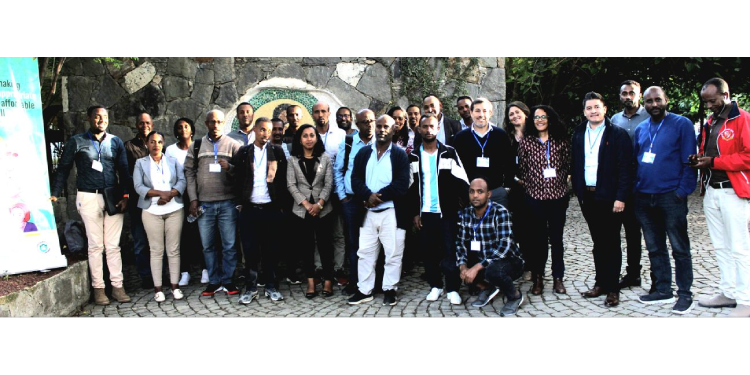EPHI, FAO, Organized Validation Workshop on Healthy Diet Affordablity

A two-day validation workshop organized by the Ethiopian Public Health Institute (EPHI) and the Food and Agricultural Organization of the United Nations (FAO), under the theme “least-cost contextually appropriate healthy dietary patterns for different substantial groups in Ethiopia”, was conducted until November 30, 2023 in the presence of experts drawn from various multi-sectoral offices, UN organizations, NGOs, and other relevant bodies.
Opening the workshop, Dawit Alemayehu, a researcher at EPHI, made speech on behalf of the Director of EPHI’s Food Science and Nutrition Research Directorate (FSNRD) of EPHI, Dr.Masresha Tessema. Dawit said that the concept of least-cost, contextually applicable healthy diets emerges as a promising strategy for overcoming the affordability barrier to nutritious foods. “Taking into account local food availability, cultural preferences, and dietary habits, this approach has the potential to foster sustainable food systems, supporting local food production and appropriate utilization,” Dawit said.
Reminding the adverse effect of malnutrition on the people, Dawit touched on the efforts being stepped up by the government to address the problem. He said that the Ethiopian Government has given top priority to initiatives taken to address malnutrition. “Various interventions have been implemented to tackle this pervasive problem,“ he said.
Speaking of the goal of the project, Dawit said that the joint effort being undertaken in this regard would validate a new methodology that “can guide the design and promotion of healthy diets that are not only least-cost but also acceptable and accessible to the diverse population of Ethiopia”.
Dawit further said that a comprehensive and culturally sensitive food-based dietary guideline has been endorsed, and currently, the pilot implementation is undergoing. This guideline, which reportedly considers the broader food system, aims at addressing the health and nutrition concerns of the people of Ethiopia, according to Dawit.
Policy Officer and Nutrition Team Leader with FAO, Maya Hageali, said in her opening remarks that the joint work being undertaken by FAO and EPHI would “help identify catalytic areas of investment and public expenditure that could enhance the availability and access to contextualized affordable healthy diets”.
Maya said that the initiative has come in a timely manner as Ethiopia is embarking on the Food System Transformation pathways, which aim to transform its economy with the agrifood system at its heart.
The project is being carried out under FAO’s Value-Added Impact (VAIA) Initiative, which aims to make healthy diets affordable by reshaping food and agricultural policies, according to the Nutrition Team Leader with FAO.
FAO’s divisions of the Agrifood Economics Division (ESA) with its Monitoring and Analyzing Food and Agricultural Policies (MAFAP) program and the Nutrition Division (ESN) are reportedly working together to implement the project.
The two-day validation workshop, which was organized by EPHI in collaboration with FAO, dwelt on presenting the outcomes of the joint collaboration of the two partners in developing livelihood region-specific, least-cost, contextually appropriate healthy diets. The workshop discussed ensuring whether the modelled diets were relevant and accurate.
According to the workshop organizers, participants were expected to develop their understanding of the methodology used to develop least-cost contextually appropriate healthy diets. They would also have ideas on how the findings could be used as input for the larger FAO project, which is exploring ways to reform agrifood system fiscal policies that balance optimized outcomes across economic and nutrition considerations. Moreover, participants are expected to have the reasoning behind the decision made thus far regarding the substantial groups selected, food groups and food lists, and constraints set for the diet modelling.
Some 30 experts, drawn from EPHI, FAO, Ministerial Offices like the Ministry of Agriculture, Ministry of Health, Ministry of Water and Energy, Ministry of Women and Social Affairs, Ethiopian Institute of Agricultural Research, Central Statistics Service, UNICEF, the Global Alliance for Improved Nutrition, International Food Policy Research Institute, Alliance 2015, and others, were in attendance.
